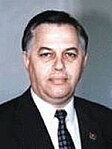
Leonid Danylovych Kuchma is a Ukrainian politician who was the second president of Ukraine from 19 July 1994 to 23 January 2005. The only President of Ukraine to serve two terms, his presidency was marked by democratic backsliding and the growth of the Ukrainian oligarchs, as well as several scandals and improvement of Russia–Ukraine relations.
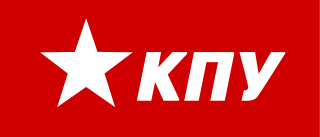
The Communist Party of Ukraine is a banned political party in Ukraine. It was founded in 1993 and claimed to be the successor to the Soviet-era Communist Party of Ukraine, which had been banned in 1991. In 2002 it held a "unification" congress when both "old and new" parties merged. The party is a member of the Moscow-based Union of Communist Parties, an umbrella organisation for all communist parties of the former Soviet Union. The party has been led by Petro Symonenko since it was founded.

The Socialist Party of Ukraine was a social democratic and democratic socialist political party in Ukraine. It was one of the oldest parties in Ukraine and was created by former members of the Soviet-era Communist Party of Ukraine in late 1991, when the Communist Party was banned. The party was represented in the Verkhovna Rada, Ukraine's parliament, from 1994 to 2007 and was the third and fourth largest party during that period. From 2007 onwards the party's electoral results became increasingly marginal, failing to win any seats in subsequent elections despite historically strong support in the central regions of the country. Oleksandr Moroz had led the party for more than twenty years before his resignation in 2012.

Elections in Ukraine are held to choose the president, Verkhovna Rada (legislature), and local governments. Referendums may be held on special occasions. Ukraine has a multi-party system, with numerous parties in which often not a single party has a chance of gaining power alone, and parties must work with each other to form coalition governments.

Petro Mykolayovych Symonenko is a Ukrainian politician and the First Secretary of the Central Committee of the Communist Party of Ukraine. Symonenko was the party's candidate in the 1999 and 2004, 2010, and until his withdrawal, the 2014 Ukrainian presidential elections. The Central Election Commission of Ukraine prohibited his candidacy for the 2019 Ukrainian presidential election due to the fact that the statute, name, and symbolism of his party did not comply with the decommunization laws in Ukraine.
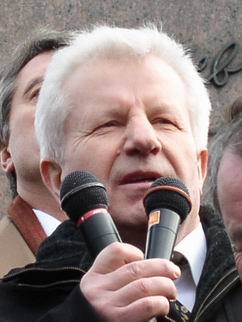
Oleksandr Oleksandrovych Moroz is a Ukrainian politician. He was the Chairman of the Verkhovna Rada twice, from 1994 to 1998 and again from 2006 to 2007. Moroz is one of the founders and the leader of the Socialist Party of Ukraine, formerly an influential political party in Ukraine. Moroz lost parliamentary representation when the Socialist Party failed to secure sufficient number of votes (2.86%) in the 2007 snap parliamentary election, falling 0.14% short of the 3% election threshold.

Yevhen Kyrylovych Marchuk was a Ukrainian politician, intelligence officer, and general who served as the fourth Prime Minister of Ukraine after its independence in 1991.
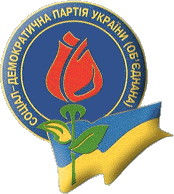
The Social Democratic Party of Ukraine (united) (Ukrainian: Соцiал-демократична партія України (об'єднана), romanized: Sotsial-demokratychna partiia Ukrainy (obiednana)), abbreviated as SDPU(o) (Ukrainian: СДПУ(о)) is a Ukrainian political party that was originally established as the Social Democratic Party of Ukraine. At the 1998 and 2002 parliamentary elections it won parliamentary seats, but has since then failed to win any seats. When in the Verkhovna Rada the party was influential, but since the Orange Revolution (of late 2004) it has been marginalized.
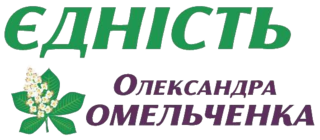
Unity of Oleksandr Omelchenko, prior to 2020 Unity is a political party in Ukraine created in 1999 as a protest party. The party was led by the former mayor of Kyiv Oleksandr Omelchenko although in early 2008, he temporally halted his party membership in favor of a membership of Our Ukraine-Peoples Self Defence. Omelchenko died on November 25, 2021.

Oleksandr Mykolaiovych Tkachenko was a Ukrainian politician who served as a People's Deputy of Ukraine from 1994 to 2012, variously representing the Peasant Party of Ukraine and the Communist Party of Ukraine. Between 7 July 1998 and 21 January 2000, Tkachenko was the Chairman of the Verkhovna Rada. Awarded with the robe of Prince Yaroslav the Wise.

Early presidential elections were held in Ukraine on 26 June 1994, with a second round on 10 July. They were held ahead of schedule following a compromise between President Leonid Kravchuk and the Verkhovna Rada. The elections saw Kravchuk defeated by his former Prime Minister Leonid Kuchma. They were the first presidential elections in the Commonwealth of Independent States in which the incumbent was defeated.

Dnipro is a monthly colour literary magazine in Ukraine. Published as Dnipro since 1944, it has its origins in the Molodniak magazine of 1927. The magazine features prose, contemporary poetry, modern Ukrainian drama, interviews, and reviews.
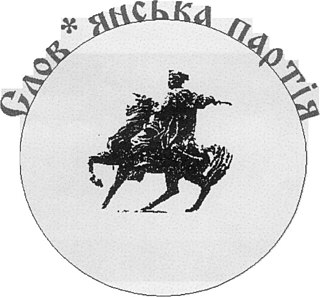
Slavic Party is a political party of Ukraine, previously known as Civil Congress of Ukraine.
Volodymyr Ivanovych Radchenko was a Ukrainian politician and General of Army of Ukraine. Radchenko served as Minister of Internal Affairs of Ukraine (1994–1995), Head of the Security Service of Ukraine, and Secretary of the National Security and Defense Council of Ukraine (2003–2005). He was also the Vice Prime Minister during 2007.

The Dnipropetrovsk Mafia, also known as the Dnipropetrovsk clan or simply Dnipropetrovtsi, is a group of Ukrainian oligarchs, politicians, and organised crime figures, and formerly Soviet politicians. While two separate groups, both iterations of the Dnipropetrovsk Mafia have been linked by their powerful influence on Ukraine and base in the southern Ukrainian city of Dnipro.

The Honorary Diploma of the Cabinet of Ministers of Ukraine is a government award for many years of hard work, exemplary performance of official duties, personal contribution to economic, scientific, technical, socio-cultural, military, public and other spheres of activity, service to the Ukrainian people in promoting the rule of law and implementation of measures to ensure the protection of the rights and freedoms of citizens, the development of democracy, and the effective operation of executive bodies and local governments.

The Kyiv Seven, also referred to as the Magnificent Seven, and the Kyiv Clan were two interrelated economic and political groups in Ukraine during the 1990s and early 2000s. The term "Kyiv Seven" refers to a group of Ukrainian oligarchs who wielded significant financial and political power in Ukraine during the late 1980s and 1990s. As the name suggests, it comprised seven members: Viktor Medvedchuk, Valentyn Zghursky, Hryhoriy and Ihor Surkis, Bohdan Hubskyi, Yuriy Karpenko, and Yuriy Liakh. The term "Kyiv Clan" more broadly refers to the groups which operated under the Seven's leadership. These groups were one of three large political clans in Ukraine during the presidency of Leonid Kuchma, alongside Kuchma's own Dnipropetrovsk Clan and the Donetsk Clan of Rinat Akhmetov and Viktor Yanukovych, among others.

Rise up, Ukraine! was a series of protests in Ukraine that occurred from September to October 2002, and then again from December 2002 to March 2003. Similarly to the unrelated Ukraine without Kuchma protests, "Rise up, Ukraine!" was aimed at the removal of Leonid Kuchma as president after revelations about the murder of Georgiy Gongadze and the sale of the Kolchuga passive sensor to Ba'athist Iraq were revealed in the Cassette Scandal. Other matters of concern were the conduct of media during the 2002 Ukrainian parliamentary election, the removal of Viktor Yushchenko as Prime Minister of Ukraine, and Russophilia within the government, among other issues.

